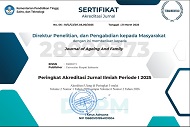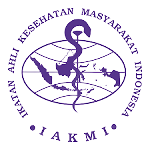Characteristics, Nutritional Status and Degenerative Diseases in the Elderly at the Curug Health Center, Serang Regency, Banten
Abstract
Degenerative disease is a disease that accompanies the aging process this disease occurs with age. Degenerative disease is a medical term used to describe a process of decline in nerve cell function without a known cause, from a previous normal state to a worse state. Several types of degenerative diseases include: osteoporosis, stroke, heart disease, gout, DM, cholesterol, obesity, etc. One of the causes of degenerative diseases is due to the acquisition of micro and macro nutrients that are not balanced. The wrong diet increases the risk of this disease. From the several types of diseases above, we can conclude that most of them are influenced by food consumption. People are now fond of consuming foods high in fat such as fried foods, junk food, instant foods. The purpose of this study was to see the relationship between respondent characteristics, nutritional status and degenerative diseases. This research is a cross sectional study, with the population as the target group of Posbindu activities at the Curug Health Center, Serang Regency, Banten and the number of samples is 124 elderly. The results showed that the majority of respondents were elderly 60-69 years as much as 78.2%. The majority of respondents have nutritional status with BMI in the normal category as much as 66.1%. Normal blood pressure (as much as 46.8% for systolic pressure and 45.2% for diastolic pressure). The respondent's cholesterol, blood sugar and uric acid levels are in normal conditions but must remain vigilant. There is no significant relationship between BMI (nutritional status) with age, sex, and systolic blood pressure. There is a significant relationship between systolic and diastolic blood pressure on age and gender in the elderly at the Curug Health Center, Serang Banten.
Keywords: Nutritional Status, Degenerative Disease, Elderly
Full Text:
PDFReferences
Hasil Pemantauan Status Gizi (PSG) Tahun 2017, Direktorat Gizi Masyarakat Direktorat Jenderal Kesehatan Masyarakat Kementerian Kesehatan 2018
Penilaian Status Gizi, Pusat Pendidikan Sumber Daya Manusia Kesehatan, Badan Pengembangan Dan Pemberdayaan Sumber Daya Manusia Kesehatan. Edisi Tahun 2017
Harahap J, Andayani LS , TALENTA Conference Series: Tropical Medicine (TM) 01 (2018), page 142-149
Adianti Handajani, Betty Roosihermiatie, Herti Maryani. Buletin Penelitian Sistem Kesehatan – Vol. 13 No. 1 Januari 2010: 42–53
Penyakit degenerative, (https://www.academia.edu/8935032/Penyakit_degeneratif), diakses 11 Februari 2020
Penyakit degeneratif pada lansia (https://www.kompasiana.com/rudywiryadi12/591fb1c3789373bc0a734654/penyakit-degeneratif-pada-lansia), diakses 11 Feb 2020
Diabetes Melitus, Indonesia Duduki Peringkat ke-4 Dunia, (https://www.liputan6.com/health/read/368590/diabetes-melitus-indonesia-duduki-peringkat-ke-4-dunia , diakses 12 Februari 2020
Hari diabetes dunia: Penderita di Indonesia bisa mencapai 30 juta orang, (https://www.bbc.com/indonesia/majalah-46194539), diakses 12 Februari 2020
Kurang Gizi Bagi Lansia, Bisa Picu Stroke, (https://www.suara.com/health/2016/06/05/124339/kurang-gizi-bagi-lansia-bisa-picu-stroke), diakses 12 Februari 2020
DOI: https://doi.org/10.52643/joaf.v2i1.2173
Refbacks
- There are currently no refbacks.
Copyright (c) 2022 Journal of Ageing And Family

This work is licensed under a Creative Commons Attribution 4.0 International License.

This work is licensed under a Creative Commons Attribution-ShareAlike 4.0 International License.














